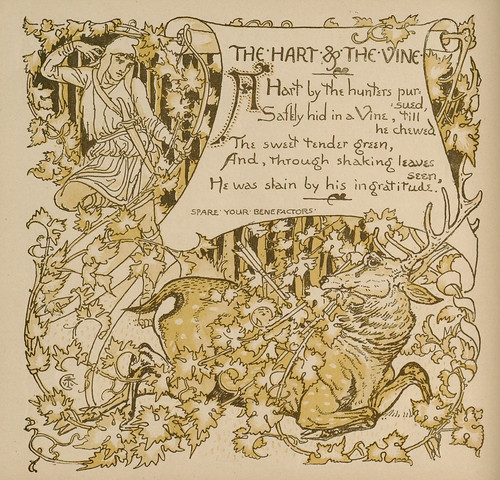HODIE: ante diem tertium decimum Kalendas Decembres (and yes, you can have your own Roman Google Calendar).
VERBUM HODIERNUM: Today's word is DUO - read a brief essay about the word at the Verbosum blog. Here's one of the sayings you can find in the essay: Ne sis amicos inter arbiter duos, "Don't be the judge in an argument between two friends."
FABULAE FACILES: The new easy-to-read fable is Cancer et Filius Eius, a "do as I say, not as I do" fable.
BESTIARIA PROVERBS: There are some new animal proverbs today for APER, the wild boar, and GALLINA, the chicken.
MILLE FABULAE: FABLE OF THE DAY: The fable for today is Cervus et Vitis, the story of an ungrateful deer. (You can also a free PDF copy of the Mille Fabulae et Una book - and there's an English fable of the day, too.)
TODAY'S MOTTOES & PROVERBS: Widgets available at SchoolhouseWidgets.com.
3-Word Mottoes: Today's 3-word motto is Dum spiro, spero (English: While I breathe, I hope).
3-Word Proverbs: Today's 3-word proverb is Rem acu tetigisti (English: You have hit the thing with the needle - or, as we would say in English, "you've hit the nail on the head").
Rhyming Proverbs: Today's proverb with rhyme is: Decipiuntur aves per cantus saepe suaves (English: The birds are often deceived by sweet songs).
Vulgate Verse: Today's verse is Sol non occidat super iracundiam vestram (Eph. 4:26). For a translation, check out the polyglot Bible, in English, Hebrew, Latin and Greek, at the Sacred Texts Archive online.
Elizabethan Proverb Commentary: Here is today's proverb commentary, this time by Conybeare: Leonem radere: Spoken where one attempteth a thinge daungerous and almoste impossible.
Today's Poem: Today's poem is from Cato's Distichs, with a word list at NoDictionaries.com:
Quod vile est, carum, quod carum, vile putato:English: "Consider what is trash to be precious, and consider what is precious to be trash: in this way you will not be known to anyone as greedy or stingy." What an elegant little saying! I like the double paradox: not only do you need to disdain the things held dear by others (money, fame, etc.), but you must also show a regard for those things which others reckon as unimportant: treasure each simple slice of bread more than you would a gourmet meal!
Sic tu nec cupidus nec avarus nosceris ulli.
Today's image is an illustration for that story about the stag and the vine: 156. Cervus et Vitis. Fugiens venatores, cerva sub vite latebat. Mox frondibus vitis vesci incepit. Ramos vero agitatos venatores videntes, sagittis cervam confecere. Moriens ait, “Haec merito patior, quia viti bene facienti nocebam.” (source - the image is by Walter Crane)
